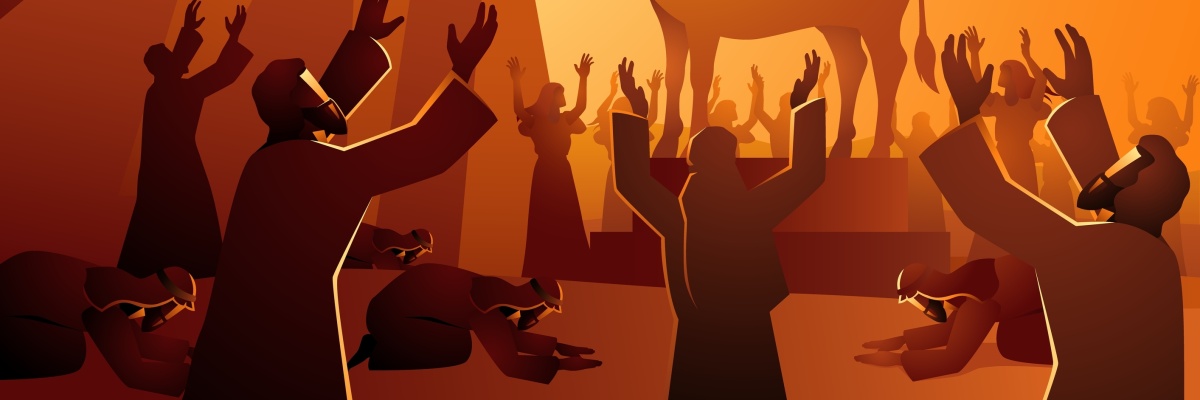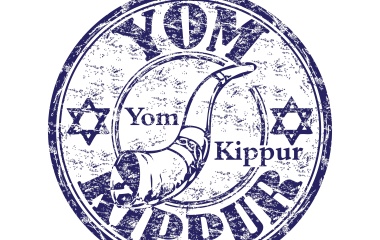
Yom Kippur marks the day that G-d forgave the Jewish people for the sin of the golden calf. And precisely because G-d forgave the people on this day, Yom Kippur became the Day of Atonement for all time and for (almost) all sins.
We would expect that much mention would be made of this in our Yom Kippur liturgy. Yet the golden calf is never directly mentioned in our Yom Kippur davening. Avoiding any mention of the golden calf is taken to such an extend that the kohen gadol, the High Priest is not allowed to wear his golden vestments when he enters the Holy of Holies to perform the special Yom Kippur service, forcing him to change his clothes five times as he navigates between the service done outside the Holy of Holies and that done inside.
After Kol Nidrei we quote Moshe’s pleading with G-d to, “Please forgive the iniquity of this nation in accordance with Your abounding kindness, as You have borne this people from Egypt until now” and G-d’s response salachti kidvarecha, “I have forgiven them in accordance with your word”. These verses come not, as might be expected, in the aftermath of the golden calf but rather in the aftermath of chet hameraglim, the sin of the spies (Bamidbar 14:19-20).
Why do we speak of the sin of the spies, something unrelated to Yom Kippur, and ignore the G-d’s forgiveness of the golden calf, the actual impetus for Yom Kippur?[1] Moreover, G-d actually forgave the Jewish people for the golden calf – only those directly involved were punished – something that is hard to say regarding the spies. While G-d did not wipe out the Jewish people as per His initial plan, the entire generation did die in the desert as they aimlessly wandered for 40 years. Is this the type of forgiveness we yearn for on Yom Kippur?
One cannot imagine Pesach without discussing slavery in Egypt, Shavuot without Matan Torah or Rosh Hashanah without Creation – despite the fact that the Torah never links Matan Torah to Shavuot nor Creation to Rosh Hashanah. Why Yom Kippur without chet haegel?
In explaining this anomaly, our Sages note that “ein kateigor na'aseh saniegor, the prosecutor cannot become the defendant” (Rosh Hashanah 26a). The sin of the golden calf is the reason for Yom Kippur – and our fate being sealed - in the first place. Our best defence is to make no mention of the golden calf as that may just conjure up images of sin and somehow harm our chances of a non-guilty verdict.
But why? Why not follow the pattern we do on Pesach? The Haggadah requires that we are to “matchil begnut umesayem beshevach, start with degradation and conclude with praise”. And that degradation means that we must declare “our ancestors were idol worshippers”. Can there be anything more powerful than highlighting how despite building a golden calf a mere 40 days after G-d revealed Himself to the people, forgiveness is possible?
While such an approach is appropriate for Pesach it does not work for Yom Kippur. The generation that left Egypt could be excused for their sin. After all, they had been slaves for hundreds of years, had lost all connection to our patriarchs and matriarchs and were surrounded by idolaters. Their idolatry reflected a desire to connect to G-d – and to do so they needed a tangible representation of G-d.
We should not think that if we engage in idolatry that forgiveness is easily attained. Our Sages teach that while Yom Kippur is necessary to achieve atonement for the sin of idolatry– it is not enough. Rather, some form of punishment does need to be meted out (see Rambam, Laws of Repentance 1:4).
At the same time idolatry is not a sin that is rampant amongst the Jewish people. And I say that with a certain sense of sadness. Many – and I include both observant and non-observant – have replaced worship of G-d with worship of money, power, honour. Be that as it may, and as important an event as the golden calf may have been in Biblical history, it has less resonance today.
Even before reciting the verses of G-d’s forgiveness for the sin of the spies, we recite another verse that also has no connection to Yom Kippur. The tragic episode of the spies has come to an end and the Torah offers some comfort by discussing various laws that will apply when the Jewish people enter the Land of Israel – the spies only delayed our entry to the Land.
The Torah then begins a new section teaching that “If you unwittingly fail to observe all of these commandments that the has declared to Moshe” (Bamidbar 15:22) listing the sacrifices that needed to be brought. This rather cryptic section concludes with the verse “The whole Israelite community and the stranger residing among them shall be forgiven, for it happened to the entire people through error”, this being the verse recited immediately after Kol Nidrei. On the surface – which is likely how the average person in shul might understand it – this refers to any and all mitzvot, a perfect notion as we begin Yom Kippur.
Interestingly, our Rabbis understood the Torah to be talking about none other than the sin of idolatry. They interpreted the phrase “all of these commandments” as a reference to idolatry which is the “one command that is the equivalent of all the commands”. Rejection of the G-d of Israel is tantamount to rejection of the whole Torah. While not a direct referral, our machzor does relate to the forgiven sin of the very first Yom Kippur.
Yet there might be an additional reason this verse was chosen. It highlights the fact that not only are the Jewish people forgiven but so too “the stranger residing among them shall be forgiven”. As being kind to strangers[2] is most oft repeated theme of the Torah – appearing somewhere between 36 and 44 times (Bava Metzia 59b) – it is a most appropriate verse to cite at the beginning of Yom Kippur. Immediately before Kol Nidrei we welcome all to shul, and immediately after we announce that the ger, the stranger too is included in our community.
This notion takes on greater meaning when we recall that the mitzva of vidui, confession, so central to Yom Kippur, is derived from a case of one who steals from a ger (See Bamidbar 5:5-7). Not only must one return the stolen goods, “they shall confess the wrong that they have done”.
This concern for the stranger and then some, manifests itself as the day draws to a close. Our Sages choose as the haftarah for Mincha the book Yonah, where G-d charges Yonah to go to Ninveh, the capital city of Assyria, the enemy of the Jewish people who would soon exile the Northern Kingdom and the ten tribes and help them repent. No wonder Yonah tried to run away.
We enter Yom Kippur as strangers to G-d. We are sinners who require forgiveness. Over and over again we recount our sins and over and over again we plead for forgiveness. The way to come closer to G-d is by coming closer to man, including and especially those who are different, those who might be strangers.
[1] We do recite the 13 Attributes of Mercy over and over again on Yom Kippur, While these were given in the aftermath of the sin of the golden calf we invoke them not because of their connection to Yom Kippur but rather because they are the template for all our prayers of forgiveness (see Rosh Hashanah 17a). Tellingly, Moshe’s pleading, G-d’s forgiving and the 13 attributes of mercy serve as the Torah reading for all fast days – with the exception of Yom Kippur, a rather glaring avoidance of the golden calf story.
[2] The word ger, means both a convert and a stranger. It is not always clear which the Torah is referring to – but the idea we develop applies to both.



